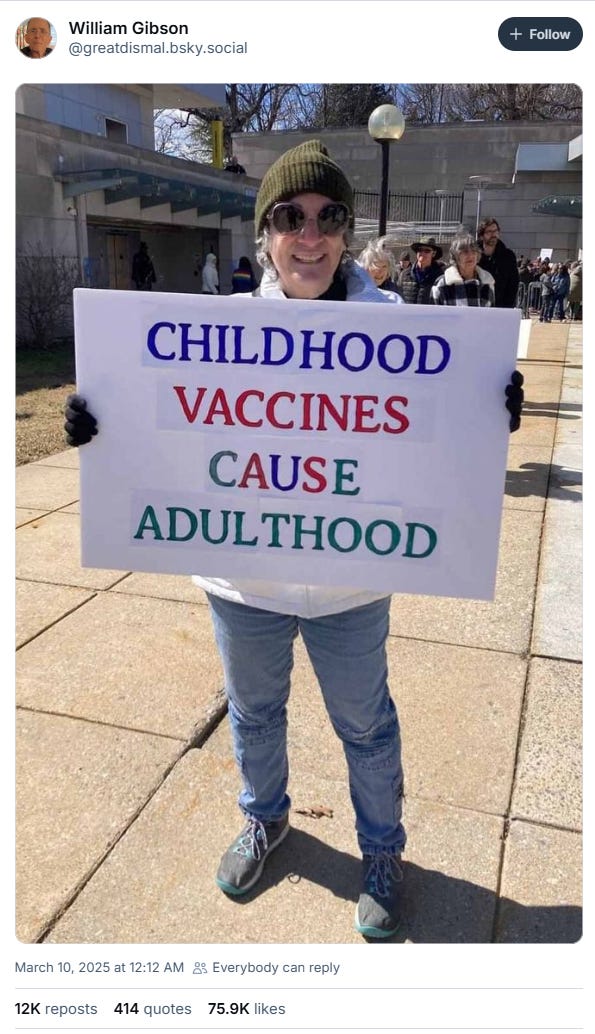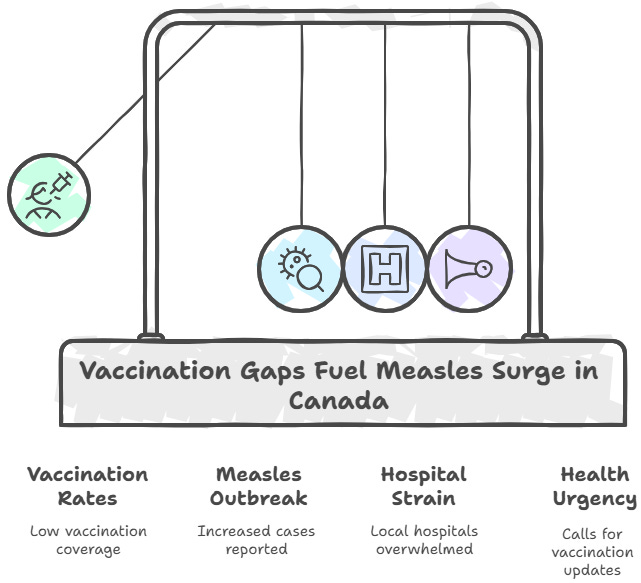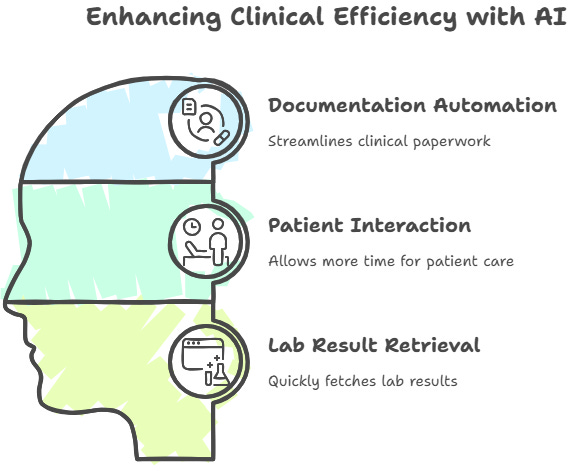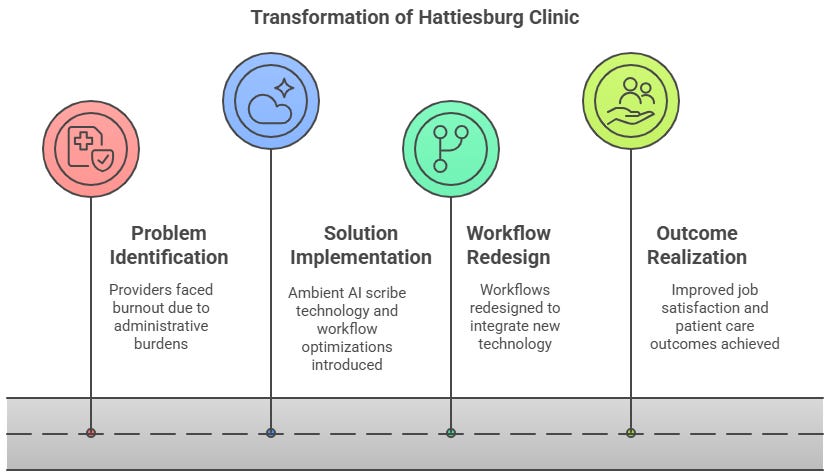⚖️ Weighty Matters Ahead
Your Weekly Dose of Health Insights – Because Your Health Isn’t Just a Headline
Good morning, Other Siders!
Imagine trying to push a boulder uphill—that's what navigating the healthcare landscape can feel like some days. But what if we could reduce the friction, making that boulder a pebble? Inspired by James Clear's concept of friction reduction in "Atomic Habits," let's explore how small tweaks can lead to monumental shifts in our healthcare journey.
At The Other Side of the Care, we're all about transforming those uphill battles into downhill strides. With our expertise in digital health strategy, operational transformation, and change leadership, we're here to help your organization glide smoothly over any obstacles.
So, lace up your running shoes (which, of course, you laid out the night before), and let's jog through this week's healthcare insights together. Ready to reduce some friction?
In today’s edition, we’re serving up:
Canadian Health Highlights:
Measles Spike in Canada 🤒
Pharmacare Deal Covers Meds 💊
Fast-Tracking Foreign Doctors 🩺
Digital and Global Health Buzz:
AI Assistant for Doctors 🤖
Global Obesity "Fail" Warning 🌍
Dive in and enjoy the ride. 🚀
News that Impacts You!
Measles Spike in Canada 🤒
Canada is grappling with a measles surge this year, reporting more cases in the first two months of 2025 than in all of 2024. In one Ontario daycare, a toddler who hadn’t gotten the measles shot sparked an outbreak, stressing local hospitals. Health officials urge Canadians to update their vaccinations.
Will communities rally to stop the spread and protect vulnerable kids?
Pharmacare Deal Covers Meds 💊
A new $670 million federal-provincial deal means big relief for patients in British Columbia. Imagine a diabetic senior who used to ration insulin now getting it free – this agreement gives universal access to key diabetes drugs and contraceptives. Health Minister Mark Holland noted it’s costlier to treat complications like blindness or amputations than to provide meds.
Will easier access to medicine keep people healthier and out of ERs?
AI Assistant for Doctors 🤖
Documentation drudgery, meet your match – Microsoft just unveiled “Dragon Copilot,” an AI voice assistant to help clinicians with paperwork and busywork. Picture a family doctor dictating a note and the AI instantly filling the patient’s chart or fetching lab results. In a hectic clinic, this could free up time to actually talk with patients.
Could a talking AI sidekick be the cure for doctor burnout and missed details?
Global Obesity “Fail” Warning 🌍
A new global study delivers a wake-up call: by 2050, over half of the world’s adults—and a hefty share of kids—could be overweight or obese. Health experts call it a “monumental societal failure”. For instance, families everywhere are finding junk food easier than healthy meals, fueling diabetes and heart issues. It’s a sobering picture of the future.
What bold steps can communities take today to turn this trend around?
💭Let us know what you think in the comment section.
🕵️♀️Case in Point
Empowering Providers in Hospitals and Clinics
Background: Healthcare providers are burning out under administrative burdens and workforce shortages – a challenge felt in hospitals across Canada too. In one notable case, Hattiesburg Clinic (a large multi-specialty clinic in the U.S.) faced poor population health outcomes and overworked staff in a rural region. Determined to improve care and provider well-being, its leadership embraced a value-based care model supported by smart technology. This meant redesigning workflows and investing in tools to alleviate clinicians’ day-to-day pain points.
The Problem: Providers were overwhelmed with paperwork, long hours, and inefficient processes. For example, nurse practitioners were spending hours driving to rural home visits one-by-one, and doctors spent many late nights typing patient notes. These inefficiencies led to fatigue and less time for patient care – a familiar scenario in Canadian settings where staff shortages leave clinicians stretched thin.
The Solution: The clinic implemented ambient AI scribe technology and data-driven workflow optimizations. An ambient scribe tool now listens during visits and auto-documents the encounter, drastically cutting doctors’ after-hours charting time – a test group of physicians saw a 60% reduction in time spent on notes after work. They also used predictive analytics for smarter scheduling: by clustering home visits for nearby patients, nurse practitioners reduced travel time and could see more patients in less time. Additionally, a dedicated care coordination team started targeting at-risk patients for preventive outreach.
The Outcome: These changes paid off for both providers and patients. Doctors report significantly higher job satisfaction and lower stress than national benchmarks. In fact, 85% of physicians felt satisfied with their job – 16% above the norm. With paperwork streamlined and smarter schedules, providers can focus more on patients, improving care quality. The clinic also saved money (e.g. millions through better care coordination and preventing hospitalizations) while patients received timelier, proactive care. It’s a clear win-win: clinicians are happier and patients stay healthier.
How We Can Help: At The Other Side of the Care consulting services specialize in provider-focused transformation. We can help Canadian healthcare organizations implement similar solutions step by step. For example, our team can assist with workflow analysis to identify bottlenecks in a hospital or clinic’s operations. We provide guidance on adopting technology like AI assistants or analytics platforms in an ethical, effective way – from selecting the right tools to training staff. Crucially, we work with leadership and frontline teams to foster a culture of innovation and collaboration, ensuring changes truly meet providers’ needs. The result? Happier healthcare workers, improved patient care, and a stronger health system for all.
📈What’s Trending🔥

Referral
The Friendly Side of Care: Bring a Pal!
Share this link with another healthcare nerd, practitioner, or someone you feel will benefit from this information
Why? Because when you do (and they sign up), you'll earn points toward some fantastic rewards. Things like points towards a free subscription to The Other Side of Care paid content and upcoming merchandise!
Your Turn, Other Siders! 💬
We’ve dished up a lot of insights – now it’s your time to shine. What do you think about these developments? Did a particular story resonate with you or spark more questions?
We’d love to hear your thoughts, experiences, or even your own ideas for solutions. Reply to this email or drop us a note on our socials. Other Siders, your perspective is the missing piece of this conversation puzzle – so don’t be shy, let us know your take! 🙌






